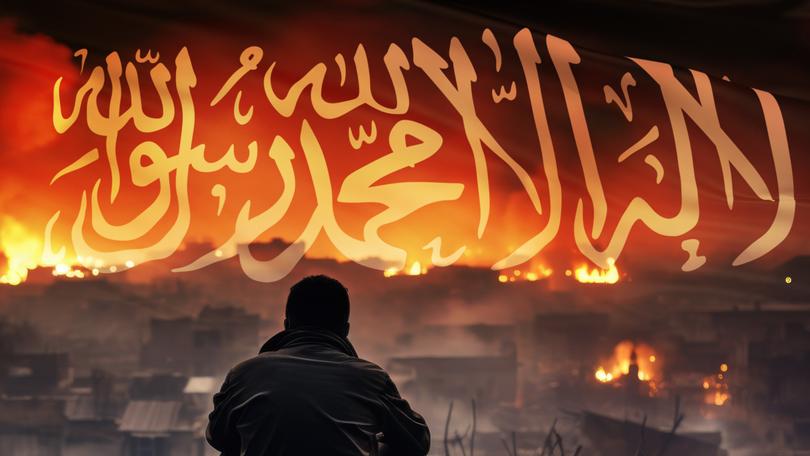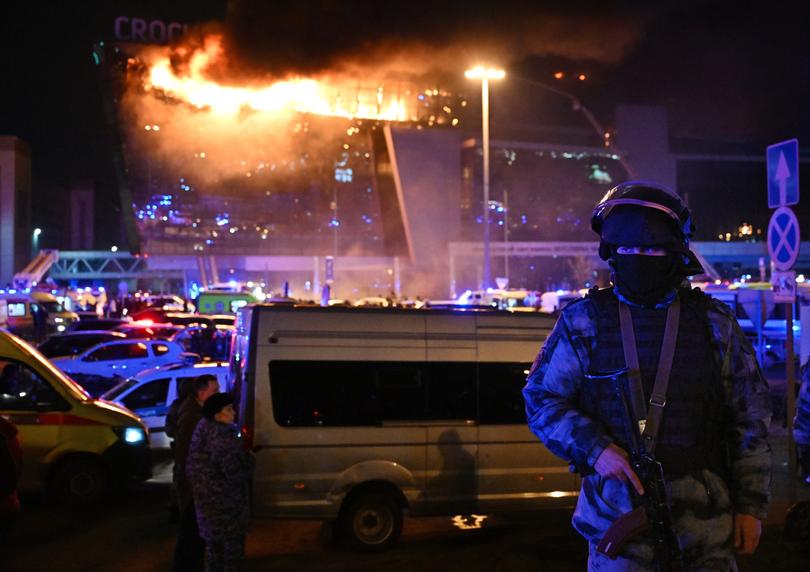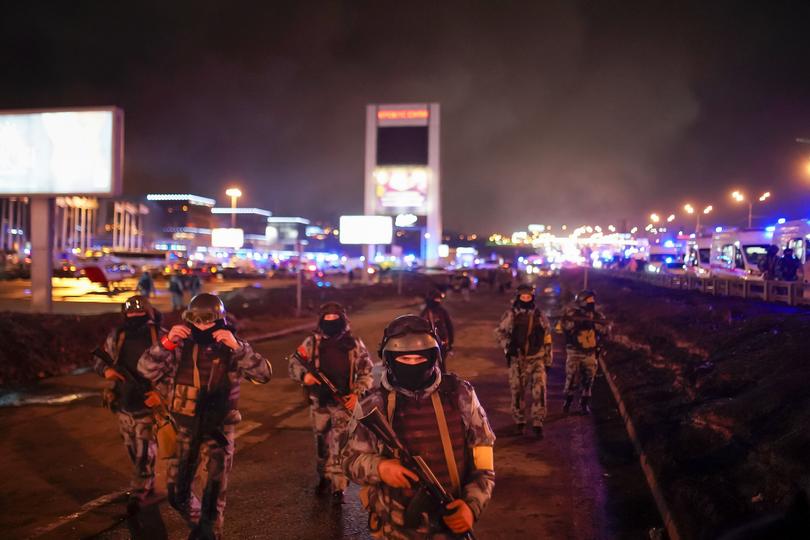The Economist: Islamic State and its offshoots are back on the march in the name of global Jihad
The devastating massacre at Crocus City Hall in Moscow showed that Islamic terrorism is far from vanquished. And there are fears Moscow could just be a training run for bigger attacks to come.

When jihadist gunmen shot their way through Crocus City Hall in Moscow on March 22nd, killing more than 140 concert-goers and setting the venue alight, intelligence agencies across the West were aghast.
It was the clearest warning that Islamic State (IS), seemingly smashed five years ago, is returning to spectacular acts of international terrorism. Western countries fear becoming targets.
The dread is deepest in France and Germany, which are hosting two of the world’s biggest sporting events this summer: the Olympic games and the Euro 2024 football championship. The floating ceremony along the Seine to open the Paris Olympics has been curtailed to limit the risk; a “Plan B” is in the works, too.
Sign up to The Nightly's newsletters.
Get the first look at the digital newspaper, curated daily stories and breaking headlines delivered to your inbox.
By continuing you agree to our Terms and Privacy Policy.“If you can do Moscow, you can do Paris,” explains Gilles Kepel, an expert on jihadism. “Moscow could be a training run for the Olympics.”
Terrorism is a grisly theatre of violence, for which mega-events offer a tempting stage. Black September, a Palestinian group, gripped the world’s attention when it took nine Israeli athletes hostage at the Munich Olympics in 1972.
IS likes to strike at big, crowded venues: the Bataclan Theatre in Paris in 2015, the Manchester Arena in 2017 and now Crocus City Hall.
These days the West has largely turned away from the long “war on terror”, having expended much blood and treasure to destroy the main jihadist groups. But extremists are on the march again. They have re-emerged in havens old and new, and are thriving in cyberspace. Furthermore, Israel’s war in Gaza is all but certain to radicalise a new generation.
The history of global jihadism is one of reinvention under pressure from the West. After September 11th 2001, America and its allies overthrew the Taliban in Afghanistan and evicted Al-Qaeda. American forces killed its leader, Osama bin Laden, in Pakistan in 2011. Then his successor, Ayman al-Zawahiri, was eliminated by a drone strike in Kabul in 2022. Al-Qaeda has yet to name a new leader.

Meanwhile IS, Al-Qaeda’s even more wanton progeny, caused a sensation by carving out a “caliphate” across large parts of Iraq and Syria in 2014, drawing volunteers from Europe and elsewhere. Its last stronghold was destroyed in 2019 and it has lost four leaders since that year began.
Even so, jihadists fight on. They still revile the West and feed insurgencies from Mali to the Philippines. Of the two brands, IS is the more dynamic. “In the war of ideas Islamic State has defeated Al-Qaeda, especially among young people,” says Aaron Zelin of the Washington Institute, an American think-tank. “IS created the caliphate, even if it was destroyed. Al-Qaeda only talked about it.”
All this, says Mr Kepel, has produced three overlapping phases of violence: attacks directed by Al-Qaeda in the 2000s; strikes enabled or assisted by looser networks linked to IS in the 2010s; and what he calls “ambient jihad”, the leaderless, self-started violence predominant in recent years.
The greater the degree of organisation, the greater the carnage jihadists can generally inflict. Without a guiding hand, lone-wolf attacks are typically less deadly, but they are harder to detect and can be horrifying nonetheless. In France, a school-teacher was beheaded in 2020 and another was stabbed to death last year. And many fret about the growing number of minors drawn to militancy.
Today the jihadist movement is dispersed and fluid. Some factions focus on fighting the “near enemy”, ie, local governments, and seizing control of territories. Others are again turning towards the “far enemy”, the West.
Today, as before 9/11, Afghanistan is exporting terrorism. President Joe Biden’s chaotic withdrawal in 2021, seeking to end America’s “endless wars”, led to the Taliban’s immediate return to power. The killing of Zawahiri was evidence that the Taliban are again sheltering Al-Qaeda figures, who are lying low. The big headache is the Islamic State’s franchise in Afghanistan, “Khorasan Province” (ISKP).
It burst to prominence during America’s retreat from Kabul, when a suicide bomber killed more than 180 people, among them 13 American soldiers. Unlike Al-Qaeda, ISKP is suppressed by the Taliban, though not entirely. It has exploited networks in neighbouring countries. By Mr Zelin’s count, ISKP conducted or attempted one attack abroad in 2021, four in 2022, 12 last year and 15 so far this year.
Among its recent targets, it bombed a memorial service in Iran for Qassem Suleimani, an Iranian general slain by America, killing more than 90 in January.
The Moscow attack proves it has the desire and capacity to cause harm ever farther far afield, say Western officials. “ISKP strikes where it sees an opportunity,” argues Hugo Micheron of SciencesPo University in Paris. “If it has not attacked in Europe it is because it has been thwarted so far.”
The situation is all the more grave given other geopolitical complexities. American forces in Iraq and Syria are thinly spread and may draw down further, not least because they have been repeatedly attacked by Iran’s allies. America is renegotiating the status of its forces in Iraq. And an American withdrawal from Syria — advocated by Mr Trump and seemingly discussed by Mr Biden — could fatally weaken Kurdish allies and result in the breakout of thousands of jihadist fighters held in their prison camps.

In the Sahel, meanwhile, coups have forced French forces to leave Mali, Burkina Faso and Niger. UN peacekeepers have also withdrawn from Mali; American troops are likely to leave Niger and perhaps Chad, too. In their place, Russia’s Wagner mercenary outfit is being hired to protect the putschists.
Whether they can beat back jihadists is doubtful. A recent UN report warns that regional branches of Al-Qaeda are gaining ground, threatening West African coastal states, and may establish a “terrorist sanctuary”. Spooks fret that, in both regions, jihadists could turn to attacking the West. A similar worry applies to Al-Qaeda’s powerful ally in Somalia, the Shabaab, and its branch in Yemen, AGAP, which have histories of cross-border terrorism.
The battle is underway in the digital realm, too. The physical caliphate may have gone, but the virtual one is potent. Jihadist tracts and videos are distributed in many languages. With the war in Gaza, the torrent has turned into a flood as Al-Qaeda and IS try to exploit fury over the suffering of Palestinians.
The ferment is likely to radicalise a new generation of Muslims. On April 25 a Moroccan asylum-seeker was convicted of killing a British pensioner “because Israel was killing children”. New terrorist groups “are probably forming as we speak”, says Christine Abizaid, director of America’s National Counter-Terrorism Centre, the main intelligence hub on jihadists. For all the horror Hamas inflicted on Israel on October 7th, she added, Palestinian groups don’t seem inclined to attack the West.
Upstaged by Hamas, which it disdains, yet unable to land a blow on Israel, ISKP is inciting its followers to strike wherever they can. “Lions of Islam: Chase your prey whether Jewish, Christian or their allies,” urged ISKP in January.
So what next? Jihadist plots in Europe, successful and failed, abated with the waning of the caliphate, according to Petter Nesser of the Norwegian Defence Research Establishment.
As jihadists regroup, however, the more organised sort of attack may return to the fore. In Europe, France is most vulnerable, in part because of the clash between French state secularism and Muslim public religiosity.
Britain and, increasingly, Germany, may be next on the hit list. They have often been targets in the past. Sweden and Denmark have drawn ire because of their Koran-burning protests. Russia is prominent, adds Mr Nesser, given its intervention in Syria in 2015 and its alliance with Iran.
Jihadists have been arrested across Europe, often with ISKP links. The group operates in part through a diaspora of Muslims from ex-Soviet lands in central Asia and the Caucasus, a change from earlier cycles of terrorism that often involved extremists of North African and Pakistani extraction. Some ISKP figures in Turkey form what the UN calls “a logistical hub for (ISKP) operations in Europe”, not least by moving funds through cryptocurrencies.
Military experience, whether in training camps or actual jihadist battles, increases the zeal and lethality of attackers. Fortunately, the flow of Western volunteers to warzones has slowed to “a dribble”, say security sources. But militants jailed for terrorism offences during earlier periods of violence can inspire and organise others once released from prison.
Some jihadists might be lurking among the mass of migrants moving to Europe and America. Nine people of central Asian extraction, arrested in Germany and the Netherlands last July for allegedly plotting attacks on behalf of IS, had come from Ukraine.
In America, hundreds of people with possible links to terrorism have been found crossing the Mexican and Canadian borders since 2022. But Ms Abizaid says there is no evidence of known “operatives” trying to slip across land borders.
If they do attack, officials fear jihadists might import technologies from foreign battlefields, such as drones that drop munitions and bombs without metal parts. Encrypted communications — in apps, video games or the metaverse — make it easier for militants to organise. Artificial intelligence, perhaps including deep fakes, facilitates the production and translation of propaganda.
Always alert
Western intelligence agencies thus have a daunting task, tracking a mosaic of jihadists abroad while trying to spot self-starting ones at home. They must also watch far-right terrorists, usually self-radicalised, who both hate Muslims and often learn from jihadist manuals. And they must monitor an older threat: terrorism sponsored by radical states such as Iran.
Ultimately jihadism reflects the profound problems of the greater Middle East. The West lacks the power to fix them and has often made them worse.
Part of the answer lies in close intelligence cooperation. America warned Russia of the looming attack in Moscow, a sign of its central role in global counter-terrorism.
The strike on Zawahiri, moreover, showed America’s ability to hit terrorists “over the horizon”. However funds and personnel have been shifted to other priorities, such as confronting the threat from Russia and China. The West may have hoped to end the war on terrorism. But the terrorists are still at war.
